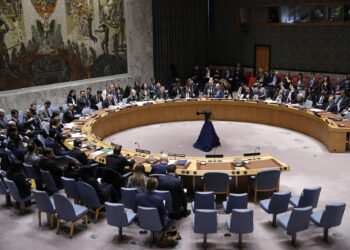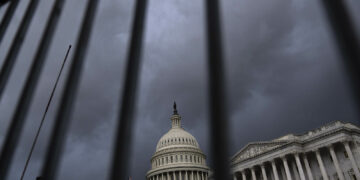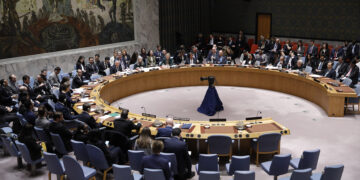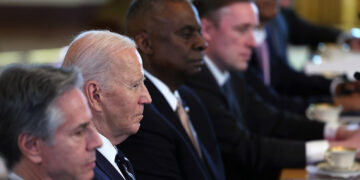The formation of the 37th government of Israel and the undemocratic and extremist policies it has advocated have raised unprecedented questions and concerns about the approach the United States should take toward Israel moving forward, particularly when viewed within the framework of self-professed "shared democratic values" and mutual interests that successive administrations have said form the bedrock of the relationship. The foreign policy establishment in Washington seems to have been caught off guard by the changes in Israel, which leaves the Biden administration with no clear rubric for responding to an Israeli government that deliberately abandons those values and interests promoted by the United States.
In its first few weeks, the new Israeli government has challenged the notion of shared values with the United States in ways unseen over the past 75 years of bilateral relations. As detailed below, it has undertaken or promised to undertake extremely dangerous and harmful policies to dismantle vital democratic institutions, expand settlements, annex parts of the Occupied Palestinian Territories (OPT), end largely superficial measures of accountability for security forces, arm more Jewish Israeli civilians by loosening criteria for gun licenses, and restrict civil and political rights. The rhetoric and well-recorded policy goals of its most radical members are dangerously mainstreaming ideologies that espouse racism and xenophobia, homophobia, religious coercion, and even ethnic cleansing.
Rather than responding to these troubling developments on an after-the-fact, piecemeal, and ad-hoc basis, it is crucial that the United States rethink, redefine, and communicate clear policy guidelines about the acts or policies it finds unacceptable, how they risk downgrading the relationship between the two countries, and the actions it will take if they are pursued. Such proactive communication regarding the limits of the "special" part of Washington's "special relationship" with Israel, represents the best realistic option for the United States to curb some of the worst damage under the new Israeli government. More importantly, in the likely scenario that the Israeli government is unresponsive to U.S. pressure, it also safeguards Washington's credibility in its push to reaffirm and strengthen a liberal, rules-based, international order.
This limited framing is admittedly insufficient for analyzing the U.S.-Israel relationship, and it does not begin to address Washington's complicity or its obligations as Israel's largest supporter to end its apartheid regime. It does not challenge the systems and ideologies of domination that the apartheid regime serves, nor does it include an explicit vision or path to guaranteeing the basic democratic and human rights of Palestinians. However, given the unprecedented stress this moment promises to put on U.S.-Israel ties, a strategic focus on more limited, viable changes to U.S. policy has the potential to steer Washington toward a reformed bilateral relationship with greater long-term potential to redress those foundational injustices and advance U.S. policy objectives.
The New Israeli Government's Agenda
Unable to form a government through four rounds of elections over three years, Netanyahu's path back to power has left him beholden to the most ultra-nationalist, right-wing, racist, religiously conservative, and illiberal parties ever seen in an Israeli ruling coalition.
Yet, Israel's new government, the sixth to be led by Prime Minister Benjamin Netanyahu over the course of 15 years, is not, from a policy perspective, fundamentally different from previous governments he headed. Recent Netanyahu governments have insisted upon maintaining a permanent Israeli military presence in the occupied West Bank; expanded illegal settlements and attempted to legalize the theft of privately owned Palestinian land; advanced annexationist policies; persecuted human rights and humanitarian groups; openly opposed the very idea of Palestinian statehood and a two-state solution; and sought to strip the country's High Court of Justice of its uncodified powers of judicial review.
However, the newest Netanyahu government has declared its intention to go much further.
Of particular concern are:
- Consolidation of Executive Power: The new Israeli government has commenced its plan to overhaul the Israeli judicial system to consolidate the power of the executive branch and disrupt any checks on its power by the country's judiciary. This plan includes: granting the Knesset the power to override High Court decisions striking down laws it deems unconstitutional; granting the executive the power to appoint judges at will, removing all existing checks and balances from the process; disempowering the authority of ministerial legal advisers to determine the legality of policies and decisions; and other measures designed to limit judicial review, including of decisions concerning political representation of minority groups. In response to the plan, the State Department said in a statement last month: "Israel's independent institutions are crucial to upholding the country's thriving democracy, and our shared democratic values are at the heart of our bilateral relationship."
- Unbridled Settlement Expansion and Legalization: The new Israeli government has presented a plan for unprecedented changes to the country's administration of the occupation, including legalizing even those settlements that prior Israeli administrations have declared illegal or "unrecognized"; and revoking the Gaza Disengagement Law, which forbids Israeli civilian presence in Gaza, as well as several West Bank settlement outposts evacuated as part of the 2005 operation that saw Israel withdraw its troops and thousands of settlers from Gaza. For at least a decade, some of the senior-most members of the new Israeli government have spoken openly about "extending Jewish sovereignty" over (unlawfully annexing) the entire area between the Mediterranean Sea and the Jordan River, a key step of which is the judicial "reforms" they are advancing now.
The Trump Administration undermined the long-standing U.S. legal position articulated in the 1978 Hansel Memorandum that settlements are illegal under international law by revoking the Memorandum. The Biden administration has been consistent, like previous administrations, in its vocal opposition to settlement expansion and in particular those considered "outposts," but it has not clearly articulated its policy on their legality short of declaring that the "call to refrain from unilateral steps certainly includes any decision to create a new settlement, to legalize outposts, or allowing building of any kind deep in the West Bank adjacent to Palestinian communities or on private Palestinian land." - Imminent Illegal Annexation by Force: The new Israeli government has started moving to implement its coalition agreement with the settler Religious Zionism political party to annex Palestinian territory. Its plan includes transferring administrative control of much of the OPT from military to civilian control, representing a clear escalation of Israel's prior policy of piecemeal, de facto annexation of the territory.
The Geneva Conventions are clear in prohibiting an occupying party from establishing civilian laws and governance over occupied territory, and permit only temporary military rule until the occupation ends, in order to avoid unilateral annexation of occupied territory. The imposition of Israeli civilian rule in the OPT also undermines the prospects of Palestinian sovereignty and amounts to unlawful annexation, similar to steps Russia has taken in occupied Crimea and eastern Ukraine by establishing civilian control over these areas in advance of formal annexation. Such steps would unquestionably fly in the face of the Biden administration's strong opposition to "unilateral actions that threaten the viability of a two-state solution and the path towards direct negotiations." While Netanyahu has long stated his absolute rejection of a two-state solution, this would represent a far more brazen and undisguised plan to ensure it never comes to fruition. - Promoting Political Violence and Legitimizing Terrorism: The new Israeli government— whether as a matter of policy, as a consequence of its policies, or fueled by the rhetoric of its members—will likely inflame and encourage political violence, including by giving security forces a sense of—or actual—complete impunity. The inclusion of a Kahanist party (Jewish Power) and extremist settlers (Religious Zionism), broadcasts a legitimization and normalization of a US-designated terrorist group and violent vigilante settlers, further empowering those groups and raising the risk of violence.
The Israeli government has appointed as national security minister Itamar Ben Gvir, a violent extremist, putting him in control of the country's police force, and expanded his legal authority to direct police policy beyond that held by previous ministers. The governing coalition agreement also lays out a plan to hand him control of what would effectively become a private militia—the Israeli Border Police, which already has a very problematic human and civil rights record. Another part of Ben Gvir's platform involves giving Israeli security forces criminal immunity for harming or killing Palestinians.
Even prior to the new government taking office, Ben Gvir's powerful new role and his well-known rhetoric were empowering extremists and encouraging political violence, particularly among members of the security forces. There have been numerous documented and reported incidents of Israeli police and military personnel openly citing Ben Gvir when harassing and physically attacking left-wing Israelis. It is more difficult to gauge the impact of his promises to give security forces impunity for harming or killing Palestinians because the existing reporting and accountability mechanisms are so ineffective. Since taking office, Ben Gvir has already begun attempts to change law enforcement policy in restricting political assembly and expression, including banning displays of the Palestinian flag and encouraging police to use more force against perceived left-wing protests and protesters.
Ben-Gvir is an ideological disciple and the political successor of Rabbi Meir Kahane and was a member of the latter's Kahane Chai party, which is a Specially Designated Global Terrorist (SDGT) entity in the U.S. and banned from public office in Israel by the country's High Court of Justice. Although Ben-Gvir's current party, Jewish Power, has taken the minimal requisite legal and semantic steps to distance itself from Kahane and the Kahane Chai party, it is difficult to ignore the lines connecting the two. In 2012, the Obama Administration banned Michael Ben Ari, the previous leader of the Jewish Power party, from entering the United States because of his ties to Kach and Kahane Chai, ties that are identical to Ben Gvir's. In 2019 the Israeli High Court barred him from running for public office in Israel because of his racist and undemocratic views. Following the latest elections, Ben Gvir attended a ceremony commemorating Kahane, in response to which the State Department stated: "Celebrating the legacy of a terrorist organization is abhorrent; there is no other word for it. It is abhorrent. And we remain concerned, as we said before, by the legacy of Kahane Chai and the continued use of rhetoric among violent, right-wing extremists."
- Assailing Civil Rights: The new government has detailed and begun executing many of its plans and intentions to curtail free speech, target human rights and humanitarian organizations, limit the political participation of Palestinian citizens of Israel, and remove guarantees of the most basic civil and human rights. One of the new government's first published decisions declared that it will "take action against" political and legal groups, specifically humanitarian organizations, operating on behalf of Palestinians in Area C of the West Bank. It has declared that it will increase its use of a law that allows the revocation of Israeli citizenship and residency on the grounds of disloyalty and has already introduced new legislation that would increase the scope of Palestinians whose citizenship and residency can be revoked. It also has attempted to enact a comprehensive ban on the display of the Palestinian flag. The abovementioned judicial reforms include downgrading the status of a quasi-constitutional amendment that the courts have interpreted to guarantee basic civil and human rights, and another piece of planned legislation is designed to disqualify politicians and political parties representing Palestinian citizens of Israel.
- Widespread Forcible Displacement: The new Israeli government is expected to pick up plans for forcible displacement that were paused or abandoned by previous governments. Minister Betzalel Smotrich, appointed as minister in charge of Israeli military policy vis-a-vis settlements and the Palestinian civilian population, has long advocated for removing Palestinian communities in large swathes of the West Bank, describing their presence as a strategic threat to Israel and part of an illegal takeover plan by the Palestinian Authority, funded by "hostile" European countries. In light of the Israeli High Court's 2022 decision permitting the expulsion of over a dozen Palestinian communities in Masafer Yatta in the South Hebron Hills and the entire village of Khan al-Ahmar east of Jerusalem, it is likely that this government will carry out those expulsions that were suspended or paused by previous governments. Smotrich and other ministers in the current government have been among the biggest proponents of carrying out those expulsion and demolition plans meant to further entrench Israeli control over the occupied territories.
Why A New Approach Is Needed
Since his first term in office in the 1990s, Prime Minister Netanyahu has established himself as a spoiler for numerous U.S. policy efforts in the region. For decades, he has done everything in his power to derail peace prospects with the Palestinians and ensure that the two-state solution remains impossible, famously bragging that he knows how to manipulate the United States. Years later, he took that temerity to Washington D.C. in an attempt to sabotage the Obama administration's flagship foreign policy initiative, the Iran nuclear deal, ultimately sinking it several years later. His primary interests today, however, are believed to be ensuring that his ongoing corruption trial is terminated and ensuring he is able to stay in power.
Netanyahu is often described as an especially brilliant politician. Over the decades, he has employed a number of strategies to balance the ideological and political aspirations of other parties and politicians to form, hold together, and when necessary, reshuffle, the entire Israeli political map to stay in power. One of his more storied strategies was ensuring that his coalitions had parties both to his left and right such that he could balance any unwelcome pressure from one side by the other. This was particularly useful when international diplomatic considerations compelled him to push back against his right flank, allowing him to stay clear of political blame and mud-slinging from his traditional base. In the current government, Netanyahu has nobody to his left and will be hard pressed to withstand the inevitable right-wing ire if he attempts to block or even slow their agenda.
Just as consequential, Netanyahu has always kept his options open. If one coalition partner threatened to pull the rug out from under the government, Netanyahu always had ongoing negotiations with opposition parties so that he could—easily or not—have options to form an alternative government. Over the past several years, however, due to the corruption charges against him and having burned too many political relationships, it does not appear that he has any other willing partners than the extremists already in his solid but slim majority coalition.
U.S. opposition to Israeli policies that undermine American foreign policy goals has thus far been limited to public statements reiterating support for a two-state solution, offering various incentives that have at best delayed undesirable Israeli actions, and at times expressing support for Netanyahu's political rivals. Previous Israeli governments have generally responded to American interventions by begrudgingly delaying plans to a later date, and usually securing additional resources or other measures of support from the United States in return.
However, such statements and incentives will be even less effective with the new Netanyahu government. As discussed, Netanyahu's new extremist partners are in a powerful position vis-a-vis the prime minister, which accordingly puts them in a seemingly inexorable position of influence over the course of the U.S.-Israeli relationship. Their messianic aspirations will not be swayed by the denouncements or even threats from the Biden administration, and they will not hesitate to use their political leverage to dissuade Netanyahu from acceding to foreign pressure. Their political ideology, interests, and future are tied to aggressively pushing in the opposite direction. Furthermore, based on a lengthy record of US support that has at best slowed Israel's territorial expansion and annexation, and buttressed by the belief that no U.S. president would impose any serious consequences on Israel, these new right-wing leaders believe they have a free hand to push harder and further than ever before.
The new Israeli government's policies and plans, as outlined above, combined with the unprecedented rise to power of extremist right-wing officials, have begun to and will continue to undermine the foundations of the U.S.-Israel relationship as it has been historically understood. It is incontrovertible that the Israeli government is the driving force behind these changes. The question this Administration must reckon with should not be whether the U.S.-Israel relationship is changing, but what it will do to shape that relationship in a way that reflects and advances its own values, interests, and foreign policy priorities.
It bears mentioning that the United States holds immense power and leverage over Israel, namely through the billions of dollars it sends in military assistance every year and the political protection it provides it from global scrutiny and accountability. Due to unchallenged domestic American political dynamics as well as the ingrained positions of the Biden administration, ending or even conditioning military assistance is politically untenable under the current circumstances. In fact, military ties have only grown in recent months, as demonstrated by the largest-ever U.S.-Israel joint military exercise, "Juniper Oak," in January 2023. There are, however, viable steps the United States can take that change the dynamic of the U.S.-Israel relationship without undermining or fundamentally altering its commitment to Israel's security.
Likewise, for reasons of practicality and ripeness, none of the following recommendations force a reckoning with the discrepancy of Israel as the United States has historically understood it, and the apartheid regime experienced by generations of Palestinians, which has been described and documented in great detail by international, Palestinian and Israeli scholars, human rights organizations, and politicians, including Al Haq, B'Tselem, Human Rights Watch, and Amnesty International, as well as numerous United Nations special procedures and commissions.
Recommendations
1. Define and Articulate 'Shared Values'
The Biden administration should articulate its view of the US-Israeli "special relationship" publicly, specifying the substance and policy dimensions of the two countries' "shared values." Only by clearly defining those values can it make clear what would represent a departure from them by Israel, specifically as related to democracy, pluralism, respect for the rule of law, democratic institutions, and division of power, among other elements. President Biden also should go on record to clarify his positions on areas where the Trump administration either changed or blurred U.S. policy, specifically on the illegality of settlements and the status of Jerusalem. Well-worn phrases such as settlements being "unhelpful" or respecting the "historic status quo" at Haram al-Sharif/Temple Mount are too subjective and fail to signal clear opposition to Israeli policies. Over-reliance on them has, for over two decades, enabled Israel's worst behavior to incrementally undermine the policy positions of the United States, not to mention international law.
Clearly establishing and defining the substance and policy implications of the stated shared values of the U.S.-Israeli relationship and a clear articulation of U.S. interests in that relationship will allow the Administration to begin to respond cogently and predictably to Israeli divergence from them. Delineating the foundations of the relationship will also make clear to all parties what is truly "unshakeable" about it, including a commitment to Israel's security, and what is dependent upon or at least greatly influenced by clear policy guidelines. Lastly, detailing and defining shared values and interests will make it easier, together with the President's long and well-known record of supporting Israel, to demonstrate that it is the Israeli government that is diverging from them.
To that end, DAWN proposes that the Biden administration compile a list of actions, policies, or norms that it considers to undermine its shared values, interests, and policy goals. The list need not be made public, but the administration should communicate it to the Netanyahu government.
DAWN proposes the following for inclusion in such a list:
- Structural changes to the balance of power in Israeli government institutions that represent democratic backsliding or a consolidation of power by the Netanyahu government
- Any construction or further approvals required to start construction of Israeli settlements in the E1 area east of Jerusalem
- Any change to the 2005 Disengagement Law that reverses or dilutes the permanence of the withdrawal from any settlement or settlement outpost
- The legalization or regularization under Israeli civilian or military law of any Israeli settlement outposts
- Any legislative changes that apply Israeli civilian laws to the occupied West Bank beyond the situation as it was on the day the government was sworn in
- Any transfer of authority over matters relating to the occupied West Bank from Israeli military authorities to Israeli civilian authorities
- The failure to earnestly investigate and hold accountable Israeli security forces implicated in harming or killing American citizens, or measures to further harm the rule of law and accountability for Israeli security forces
- Policy changes or other actions that enable, encourage, or permit settler violence or grant or lead to impunity for violent settlers
- Any further punitive, legal or administrative measures against Palestinian civil society groups, including those Israel has wrongfully designated as terrorist organizations. This should include arresting or harassing their staff, imposing travel bans, seizing property, or enforcing existing closures
- Legislation or policy changes that lead to the persecution or harassment of Israeli human rights organizations, lawyers, or civil society activists
- Any acts of collective punishment against the Palestinian people, including the seizure of or failure to transfer its legitimate tax revenue, for any reason
- The imposition of new restrictions on the movement of people, goods, or humanitarian materials in and out of the Gaza Strip or West Bank
- Any punitive or retaliatory measures taken against international humanitarian organizations, their staff, or property, including changes to existing visas and number of visas granted and denial of entry to visiting staff
- Punitive or retaliatory steps over diplomatic measures within the UN system taken against Palestinian officials, institutions, or which harm Palestinian communities
- The forced or indirect coercive transfer of Palestinian individuals or communities from Masafer Yatta (Firing Zone 918) in the southern West Bank or Khan al-Ahmar
- Permitting any further changes to the status quo at Haram al-Sharif/Temple Mount, including its use as a political platform for Israeli politicians and government ministers
This list is neither intended to be exhaustive nor do all of the items need to be adopted for it to be effective. It can be viewed as a menu of options or a template.
2. Prepare Responses That Reflect the Changing Relationship
Due to the Biden administration's lack of appetite for public or private confrontation with Israel, and due to the doubtfulness of whether such confrontations or demands would be met positively by the new Israeli government, we are proposing responses that, while triggered by specific actions or policies, should not be formulated as direct responses or sanctions intended to reverse those acts.
Instead, the Biden administration should inform the Israeli government in advance of the actions it will take. It should take care to communicate that it is Israeli policies and actions which are straining and potentially downgrading the "special relationship." This will ensure that the Israeli government is on notice of the U.S. government's position and can factor the anticipated responses into its decision-making process.
DAWN proposes the following for consideration for inclusion in such a list of responses:
- Support Palestinian bids for full UN membership
- Support or refrain from vetoing UN Security Council resolutions on the Israeli-Palestinian situation that conform with U.S. policy or policy goals
- Refrain from serving as a "diplomatic backstop," i.e. shielding Israel from criticism and resolutions in other international forums on matters relating to the Israeli-Palestinian situation or on Israel's treatment of Palestinians, including Palestinian citizens of Israel
- Restore and formally adopt the State Department's "Hansell Memorandum," which concluded that all Israeli settlements in the OPT are illegal under international law
- Enforce the exclusion of all goods manufactured or processed by Israel or Israelis in the OPT, specifically in Israeli settlements or industrial zones, from the 1985 United States-Israel Free Trade Agreement
- Reopen the U.S. Consulate in East Jerusalem with or without Israeli agreement
- Reverse the Trump Administration's removal of geographic restrictions from the founding agreements establishing the three main U.S.-Israel binational foundations—Binational Industrial Research and Development Foundation (BIRD), Binational Agricultural Research and Development Fund (BARD), and Binational Science Foundation (BSF),—which forbid US funding going to Israeli institutions in the OPT
- Designate Hilltop Youth and other violent settler groups as a foreign terrorist organization, potentially under Executive Order 12947, and identify U.S. persons and organizations that could be complicit in supporting or abetting them
- Revoke arms resale licenses for Israeli exports of materiel or technology, any part of which falls under a U.S. export license or is manufactured or developed in cooperation with the U.S. government or any U.S. entity
- Freeze any current or future bilateral discussions or negotiations on the renewal of Israel's MOU on Foreign Military Funding and inform Israel that upon the expiration of the current MOU in 2028, future financing will be legislated annually in the National Defense Authorization Act in line with all other recipients of military aid, and not in bilateral 10-year agreements
This list is not intended to be exhaustive. It can be viewed as a menu of options or as a template.
These steps need not cut away the historical core commitments the United States and President Biden have made to Israel's security. They should, however, revisit the blank-check nature of American security assistance and political support for successive Israeli governments. While DAWN believes that the United States should end all military support for Israel as long as it does not meet its human rights and other international legal obligations vis-a-vis every person living under its effective control, we acknowledge that such an ask is not one the Biden administration will pursue






































